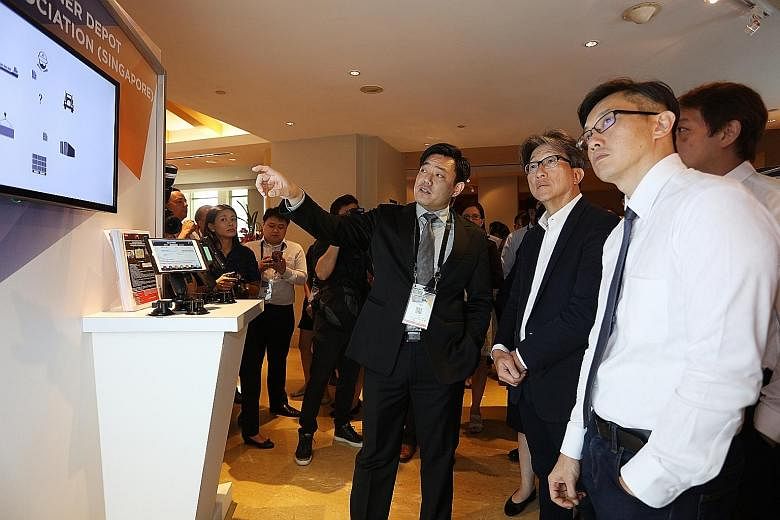Creating better-quality jobs
More than 1,400 companies have started projects under a government scheme that helps small and medium-sized enterprises (SMEs) to be leaner on labour and more productive in their use of other resources as well.
The year-old Lean Enterprise Development (LED) Scheme has helped SMEs like restaurant chain The Soup Spoon to automate and cut workers at its outlets by 25 per cent.
At manufacturing firm Onn Wah Tech, automation has cut down the number of workers for a pin-insertion process from four to one. Also, the process is now two times faster.
The number of companies that have gone leaner and their achievements were highlighted by Manpower Minister Lim Swee Say yesterday when he gave an update on the scheme launched in October last year as a two-year pilot project.
He was speaking to more than 600 employers at a symposium, at which about a dozen organisations shared their success stories.
-
Two beneficiaries
-
THE SOUP SPOON
After opening 28 outlets here, the restaurant chain wants to expand abroad. But it needs to keep its soups fresh. It turned to Spring Singapore for funds.
A high-pressure processing machine it bought lengthens the shelf life of its products from two weeks to three months.
The firm also cut down its number of workers by digitising services such as ordering and payment at outlets.
To fill the gap while it sent staff for training, it turned to the LED Scheme's transitional foreign manpower allowance to hire six workers.
CONTAINER DEPOT ASSOCIATION OF SINGAPORE
Funds from Spring Singapore and Workforce Singapore helped to introduce an Electronic Container Trucking System that links drivers and trucks with depots, ports and warehouses.
Drivers no longer need to get out of their cabins to register and pick up order documents.
The system also meshes with the existing Container Management System, cutting queueing time by 30 per cent. Drivers can also make an extra trip or two each day.
LED provides one-stop support for SMEs - which form the bulk of firms and employ about 70 per cent of the 3.7 million workers here - that need money for upgrading.
It also gives them the room to employ foreigners as an interim measure while they raise the quality of jobs or train Singaporeans for new and improved jobs. But fewer than half of the 1,400 companies needed to use this provision while implementing their projects, Minister of State for Manpower Teo Ser Luck told reporters at the symposium.
The need for such foreigners for a project is reviewed yearly and their numbers can be renewed for up to three years. But whether other companies can apply for these extra workers after the two-year pilot period will be decided later, he said.
In the economic slowdown coupled with the tepid labour market, Mr Teo said firms need to hasten restructuring."There's a lot that companies can do in different ways to keep their manpower lean through automation, through process redesign, job redesign. We're hoping that we can introduce many other different schemes to help them," he added, without elaborating.
The symposium was organised by the LED task force - the National Trades Union Congress and government agencies - and the Singapore Manufacturing Federation.
Mr Lim, in his speech, spoke of the urgency of getting SMEs to transform. The local workforce may stagnate in the next decade, amid an ageing population and a low birth rate, he said. "With foreign manpower growing much slower too, our challenge is to ensure this sharp drop in our total workforce growth will not become the bottleneck in the future growth of our economy and SMEs."
In helping the SMEs, the task force found four types of firms.
These include the unaware and the unwilling to change, the willing who do not know how, and those who can band together to implement larger-scale projects for the whole industry.
The Soup Spoon's managing director Andrew Chan sees his goal to move up the food chain - from selling food in Singapore to manufacturing food to sell overseas - resulting in better-quality jobs. "We can move from lower-skill assembly jobs to more roles in sales, research and development, food technology, logistics supervision and quality assurance," he said.
"There is also more scope for training, exposure and advancement for the staff."


